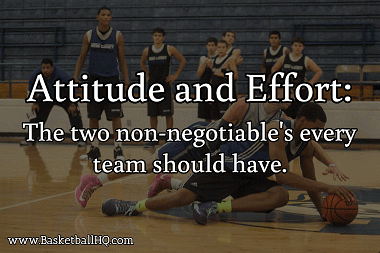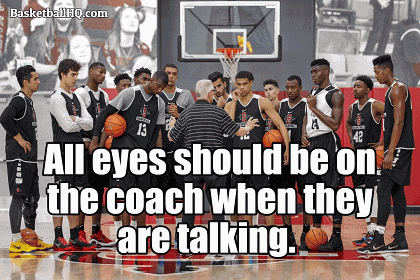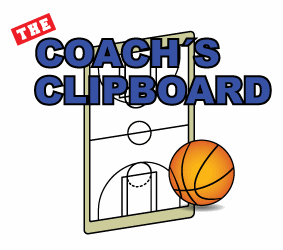How Youth Coaches Can Better Prepare Their Players for High School Basketball by Kyle Ohman
From the Coach’s Clipboard Basketball Playbook"Helping coaches coach better..."
Kyle Ohman is the co-creator of Basketballhq.com a basketball training website designed for coaches and players. He was a thousand point scorer at Liberty University (div. 1), was ranked the 19th best shooter in the country by Fox Sports going into his senior year.
Kyle has also played professionally in Spain. Most recently he coached a high school team out of Brandon, FL that played on a national level and beat the 12th ranked team in the nation. Coach Kyle has a promising career in the basketball industry as a coach and an individual trainer.
When a high school coach is looking to set their team roster, they must take into account a lot of different factors. There are the obvious factors like points, assists, rebounds, etc., which most people outside of the game focus on, but there are also other areas that are always being evaluated as well. There is attitude, effort, IQ, etc. that must also be evaluated as well.
The goal of this article is to highlight some of these other areas that high school coaches will be focusing on. That way, as a middle school or youth basketball coach, you will be able to better prepare your players for being able to play at the next level. And, even though this article is going to be geared for coaches, it can still be an excellent checklist for players to focus on as well.
So here are eight different areas that you should be focusing on with your players and making sure that you are holding them accountable in.
Attitude and Effort
This key is non-negotiable. As a coach, you already fully understand this, but especially as players get older, there is no reason why they shouldn't be giving their best effort every day and doing it with a great attitude. Even when players aren't "feeling it," they need to be giving their best. As a coach, this is something that you need to preach on a daily basis. You need to make sure that you don't allow your players to slip by with less than their best attitude and effort. If you allow players to have a bad attitude or give poor effort when they are younger, it will only be that much more of a bad habit that they will have to break later on down the road.
Basketball IQ
Doing basketball drills and different moves are great, but it is also vital that you are teaching your players how to think the game as well. This is one of the key areas that I focus on as a basketball trainer in Tampa and it has paid out big for the players I have worked with. It is not just enough to do a drill, you must also teach how it is applied to the game.So as you teach different moves or actions, take the time to explain and breakdown why they should be done the way that they are done. Teach your players how to read different situations and show them what they should be looking for. And, if this is not one of your strong suits, continue to learn yourself.
Quick Learner
There are only so many minutes in practice or workouts, coaches need players that are quick learners. The longer a coach has to go over a specific action, the less time they have to work on other key areas. So the quicker a player is able to learn, the more a coach is going to value them.Also, a coach wants to be able to know that mid-game or late-game, they are able to throw in a wrinkle and their players are going to be able to understand and execute. As a youth coach, challenge your players to stay locked in when you are talking and have them listen with both their ears and their eyes, this will really help with the learning process.

Buying Into a Role
Great teams are filled with players that execute THEIR role extremely well. Coaches want players that understand this and are willing to buy into the role that is best going to help the team. However, that doesn't mean that roles can't change. Encourage your players to work and develop their game so that they can have a bigger role, but also challenge them to buy into mastering the role that is going to best help the team.Make Shots
I know, I know, in the opening paragraph I said areas "outside of scoring." It is important to note though, that coaches are looking for players that are consistent shot makers. It doesn't mean that they have to put up a ton of points, but it means that they can knock down an open shot when the ball is passed to them. Depending on the player, this is going to be different types of shots as well. It also means that players need to value every shot that they shoot and not force up bad shots that have a low percentage chance of going in.Take Care of the Ball
Turnovers will kill an offense and allow for easy baskets for the other team; that cannot happen. Teach your players to be strong with the ball, use pass fakes, and play under control. If a coach is able to trust a player to take care of the ball, that player will be able to add a ton of value to their stock. On the flip side, if a player is constantly turning the ball over, they are not going to be able to play. Work with your players and teach them to be confident with the ball, and help them learn to make the right reads as they make passes.Creating for Others
The better the competition, the more being able to create for others comes into play. It isn't enough for a player to just be able to create for themselves, they must also help other teammates get shots as well. Also, if a player has a balanced approach to being able to create for themselves and also teammates, they will keep the help defense honest. So really lock in and focus on this with your younger players. Teach them how to be able to drive and kick, make the extra pass, set a great screen, and whatever else will help to create for teammates.Conditioning
A player's conditioning level is an easy indicator for a coach on their level of commitment to being a part of the team. If a player shows up out of shape, it shows that they are not valuing what the team is trying to do. It is a different story if a player is coming off of an injury or something like that, but if there is not a legitimate excuse, there is no reason why every player shouldn't be in shape. So make sure to challenge your players to always be in shape, especially when they show up at the beginning of a season.Conclusion
As a basketball coach, you are most likely already focusing on a lot of these different areas with your players, but it is good to have a reminder of what should be valued. As a coach myself, I am constantly having to refocus and remind myself of what is most important.It is also important that as a coach you are continuing to develop your coaching skills as well. The more you are able to learn as a youth basketball coach, the more you are going to be able to pass on to your players. So make sure to take advantage of all of the basketball learning you can. Whether it is reading books, online basketball resources, or DVD's, always continue to be learning and growing.
So, hopefully, this checklist of different areas that you can be focusing on with your players will help you do the same. Because regardless of what level you coach at, we all have a responsibility to help develop our players as best we can.




